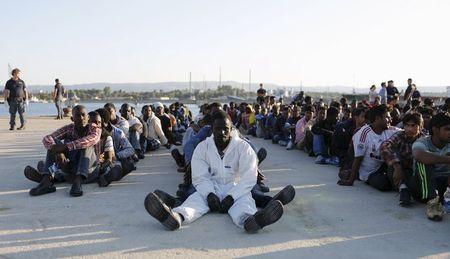Advertisement
Hungary defies EU over migrants as crisis mounts
BRUSSELS/BUDAPEST (Reuters) - In a challenge to European leaders before a summit that aims to tackle a refugee crisis, Hungary unilaterally suspended an EU asylum program on Tuesday, saying it was overburdened by illegal migrants.
As Italy said its ships had rescued 3,700 migrants at sea since Monday and Libyans threatened military action against EU moves to curb human trafficking, Hungary's Prime Minister Viktor Orban's government demonstrated Budapest's frustration with proposals to spread asylum seekers around the continent by refusing to take any more migrants sent there under EU regulations.
With EU leaders due to debate a new scheme on Thursday to relocate Mediterranean migrants landing in Italy and Greece, the European Commission demanded an immediate explanation after Hungary stopped accepting foreigners returned there from other EU states for their asylum requests to be handled by Budapest.
The move, made by a government already at odds with Brussels over civil rights, was seen as a challenge to the Dublin Regulations which state that asylum claims be handled in the EU country where migrants first arrive or first request protection.
The issue has this month sparked a row between founder EU members Italy and France after Paris began stopping suspected illegal migrants at their normally open border.
Hungarian officials have said an EU plan to relieve the strain on Italy and Greece fails to recognize their own problem with some 60,000 migrants who have crossed Hungary's EU land borders, mostly from non-EU Serbia. Orban has said a Commission proposal to force states to take a quota "borders on insanity."
A government spokesman said on Tuesday: "Hungary's asylum system is overburdened, the most overburdened among EU member states affected by illegal immigration."
EU Migration Commissioner Dimitris Avramopoulos spoke to Hungarian officials late on Tuesday, seeking an explanation of a move the Commission said Budapest described as "technical."
"As the Dublin rules do not foresee the suspension of transfers by the receiving member states, the Commission has asked Hungary for immediate clarification on the nature and extent of the technical failure, and on the measures taken to remedy the situation," a Commission spokeswoman said.
The Hungarian government said in a statement: "Hungary has used up the capacities at its disposal."
"The situation requires fast action; in this escalated situation Hungary needs to take a move ahead of EU decisions," it said.
Hungary last week announced plans to build a fence along its border with Serbia to stem the flow of migrants from the Middle East and Africa who enter Europe through the Balkans. Most eventually move on to wealthier Western Europe.
Meanwhile, neighboring Austria said it was pushing to resolve the latest problem with Hungary.
Facing a growing crisis as hundreds of thousands of people every year risk their lives to flee civil war and poverty in the Middle East and Africa, European leaders were pushed into action after some 800 people drowned on a single boat in April.
But the 28 member states of the EU, whose leaders will meet in Brussels on Thursday and Friday, are divided on a plan from the EU executive to oblige them to take a share of 24,000 Syrians and Eritreans now in Italy and 16,000 from Greece. Diplomats say they may compromise by accepting such numbers on a voluntary basis.
With voters increasingly hostile to immigration as the bloc continues to struggle with economic malaise that has pushed Greece to the point of bankruptcy, the Dublin system dating from the 1990s is widely viewed as deeply flawed.
There is little consensus on how to address the problem in the short term, but longer-term responses - such as boosting aid, discouraging economic migrants in Africa and accelerating the return of failed asylum seekers - are on the summit agenda.
On Monday, EU foreign ministers agreed a naval operation to combat people-traffickers who have carried thousands of migrants on perilous journeys across the Mediterranean.
But the air force commander of Libya's internationally-recognized government warned that any vessels entering Libyan waters without permission faced air strikes.
"Any vessel found in Libyan waters without previous cooperation or permission will be targeted by the air force," Saqr Al-Jaroushi told Reuters. His administration is one of two rival governments battling for control following the Western-backed overthrow of Muammar Gaddafi four years ago.
The self-declared National Salvation government, set up last summer when an armed faction called Libya Dawn took over the capital, has also expressed its "deep concern" over the EU plan.
The EU naval initiative will be limited to intelligence-gathering for now using submarines, warships, drones and helicopters because it has yet to obtain the United Nations' authorization for a wider scope of operations. An initial plan was to disrupt the traffickers' business and to capture and destroy their ships, possibly even in Libyan waters.
Ships patrolling the Mediterranean have plucked more than 3,700 migrants from overcrowded and unsafe boats in the last two days alone, Italy's coast guard said on Tuesday.
Italy estimates 60,000 people have made it across so far this year while the U.N. says almost 2,000 have died in the attempt.
(Additional reporting by Shadia Nasralla in Vienna; Writing by Alastair Macdonald)



















Add new comment